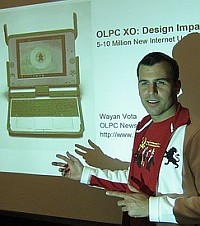OLPC News Community of Practice
Recently, I’ve been looking at OLPC News in a whole new light. I’m seeing it as more than just a blog. In fact, when you bring in the OLPC Wiki, I see a three part system that is the community of practice around the One Laptop Per Child program.
First, a definition of a community of practice:
A community of practice is a group of people who share a common passion for a subject and through regular interaction and communication, improve their knowledge and expertise in the topic area. Communities of practice differ from teams and networks in that they are bound by a shared desire to learn, and implement the learning through practice.
I believe that the triumvirate of OLPC News, OLPC News Forum, and OLPC Wiki serve to accomplish four goals typical of a community of practice.
Navigating Nigeria at Night
I am walking down this dark lane in Lagos, happy. It’s the end of a long day of work meeting many different IT people here in Nigeria, the “Giant of Africa” and I am feeling good.
Maybe it’s the excitement of being back in Africa, her sounds, sights, and smells fresh in my mind. Maybe it’s the feeling of progress in meeting our local partners and doing work I love. Or maybe its just the beer.
No matter, I am excited this night, and so I perform a small miracle.
Read MoreNo Hurry in a Lagos Go Slow

A late-night “Go Slow”
Think back to a bad traffic day. When you sat in your car, inching along in a morning commute that seemed to take forever. Or a drive home that doubled in length because a traffic accident. Now think yourself lucky.
In West Africa, traffic is approaching total and permanent gridlock. And I’m not talking about the American kind, where a one-hour commute, becomes a two-hour commute, or your average speed drops to 30mph.
I’m talking about gridlock that makes vehicles useless, has managers sleeping in hotels next to work, and sends the populace out at 6 or 7am to travel 5km in time to start the work day. I’m talking about the Lagos “go slow”.
In the commercial capitol of Nigeria, there are four and five lane highways. There are overpasses and rapid bus lanes. And there are a mix of buses, cars, and motorcycles for human conveyance. But for the 14 million people of Lagos, cross-town movement has become impossible.
Read MoreGenerating the Nigerian National Anthem

The morning growler
Disregard what others may say is the Nigerian National Anthem. It is not the first anthem “Nigeria We Hail Thee” nor the second “Arise, O Compatriots“. Those may be official decrees, and “Nigeria We Hail Thee” may be the most popular of the two, but neither compare to what I say is the real national anthem.
Anywhere in Lagos, any time of the day or night, there are two sounds guaranteed to sing forth in a chorus of noise: the rumble of big diesel generators turning on and high squawks of little horns from every passing vehicle.
Read MoreFrom OLPC to ASUS: An Overview of 4P Computing
Three years ago, the IT industry was shocked with a radical idea – a “$100 laptop” designed specifically for education in the developing world. Price would be low and yet quality high, through innovative design mixed with low-cost components, and sales would be focused exclusively on the developing world.
This heretical bombast upset the longstanding computer manufacturing tradition to keep adding functions to maintain high prices in the developed world, while ignoring the developing world. While the revolution was lead by One Laptop Per Child and its visionary founder, Nicholas Negroponte, we now have a whole plethora of revolutionaries – from the upstart Asus to the goliath Intel – who are developing 4P Computers.
4P Computing is a new class of appropriate technology – computing power, performance, portability, and price specificity designed for the realities and markets of the developing world.
Now join Wayan Vota, an expert on ICT in the developing world, in an overview of this revolution, the resulting 4PC’s, and their impact on the whole information and communication technology industry:


